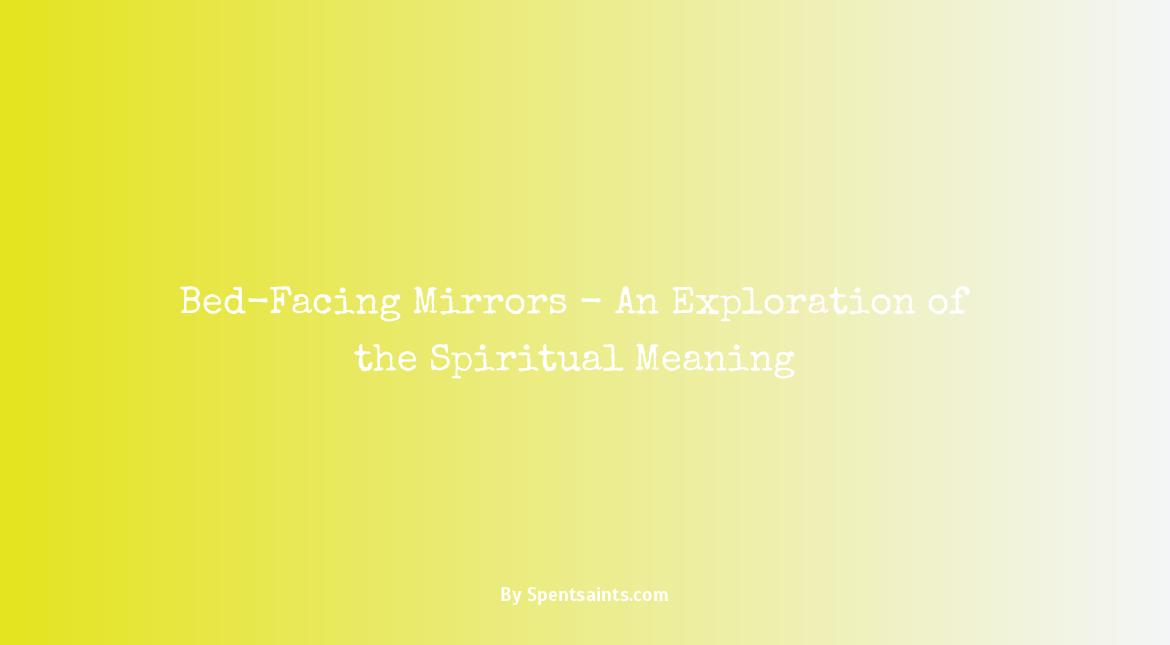Mirrors have long been thought to hold mystical powers. Their reflective surfaces provide a glimpse into another realm and allow us to see ourselves from an outside perspective. In feng shui and other spiritual practices, mirror placement is believed to greatly impact the energy flow in a space. One debated position is having a mirror directly facing the bed. What does it mean spiritually for a mirror to face the bed? Let’s delve into the history, meanings, and tips for proper placement.
Some argue it’s bad feng shui and disrupts sleep and relationships, while others say it promotes self-love and intimacy. As with most spiritual topics, opinions vary.
History and Origins of Spiritual Mirror Placement
The origins of spiritually-based mirror placement can be traced back over 4000 years to ancient China. In traditional feng shui teachings, mirrors are thought to double and reflect energy. The ancient Chinese also saw mirrors as protective tools to deflect negative energy and evil spirits.
Specific mirror positioning emerged from these beliefs. Above the bed was considered optimal to promote health and positivity. Mirrors facing the door defended against outside forces entering. Angled mirrors created a smoother energy flow. Meanwhile, mirrors directly facing the bed were believed to disrupt sleep and amplify arguments between partners.
While feng shui provided the foundations, spiritual mirror placement has expanded across cultures. In Vastu Shastra, an Indian design philosophy, mirrors heighten romance so are welcomed in bedrooms. European superstitions caution against covering mirrors to prevent trapping souls. Meanings also vary between spiritual advisors today.
Common Placements and Their Meanings
Facing the Bed
In classical texts, facing the bed was inadvisable because mirrors double energy. The reflection was thought to intensify your own energy back at you, disrupting sleep. Some modern advisors uphold this belief. The mirror can trap energy, stimulating restless dreams. It also allegedly fosters self-criticism about physical appearance right before bed.
However, others view bed-facing mirrors positively. Seeing yourself while intimate or sleeping can promote self-love and confidence. The reflection creates a larger feel and may aid lucid dreaming and astral projection practices. Overall, facing the bed promotes introspection.
Facing the Door
Mirrors facing the entryway defend against external negative forces in classical feng shui. They reflect energy from the busy outer world rather than your inner sanctuary. Historically, evil spirits traveled in straight lines so were bounced back before entering.
Today, it still protects against outside stress entering your private space. The reflection also allows you to see who is entering and affirms your sense of belonging.
Above the Bed
Hanging a mirror above the bed is considered universally auspicious across schools of thought. The superior position harnesses your dreams and aspirations. It reflects your sleeping form up to the heavens, expanding your energy and possibilities. It also symbolizes your higher self looking back down at your body.
The expansiveness combats confined mindsets and dissolves negative energy. Overall, it promotes health, self-awareness and personal growth.
Pros and Cons of Having a Mirror Facing the Bed
Pros
Makes the Room Feel More Spacious
A mirror facing the bed practically enlarges the look of a smaller room. The reflection gives the illusion of more space and natural light. It creates depth without cluttering the room with furniture or art.
Allows You to See Yourself
Pragmatically, a bed-facing mirror lets you see yourself. You can check your appearance as you get ready in the mornings and nights. It’s convenient for putting on makeup, styling hair or accessorizing outfits.
Convenient for Getting Ready
On a practical level, a mirror facing the bed is convenient. You can get fully dressed and ready without leaving the bedroom. It lets you multi-task and utilize the often wasted time during the morning and night routines.
Cons
Interrupts Sleep and Causes Insomnia
In terms of sleep, some argue a mirror can disrupt rest. The subtle reflections, lights and movements may distract you from fully relaxing. The energetic amplification can also overstimulate the nervous system, causing insomnia or frequent waking.
Reflects Negative Energy Back at You
Spiritually, mirrors double energy so can accentuate negative thought patterns before bed. You may fixate on flaws in your appearance rather than quieting your mind. It also bounces worries and stress back at you rather than absorbing them.
Heightens Self-Consciousness
Seeing your reflection last thing before sleep and first thing waking up can foster self-criticism. While self-love is ideal, many become preoccupied with perceived physical flaws. It also emphasizes awareness of yourself rather than dissolving the ego.
Mirror placement requires weighing practicalities and spiritual insights. Here are some best practices:
- Add mirrors consciously, not just for decorative purposes
- Select locations where you want reflections of yourself or space
- Angle bedroom mirrors towards walls or windows instead of directly facing the bed
- Keep mirrors cleansed and covered when not in use to clear stagnant energies
- Introduce mirrored accents in moderation to allow restful spaces
- Balance with matt, absorptive textures and removing mirrors from spiritually-active areas like meditation spaces
Most importantly, observe how you feel with the mirror placement. Notice the quality of sleep, dreams or time spent getting ready. Check if self-talk or intimacy improves. Monitor energy levels and relationship dynamics. Adjust placements accordingly to see what aligns best.
While ancient traditions provide guidance, your direct experience offers the greatest wisdom. Experiment, tweak and see what mirror positions in your bedroom optimize balance, self-love and restoration.

Dreams, spirit, growth – I explore them all. Laugh, learn, grow with me. Unlock your inner guru.
